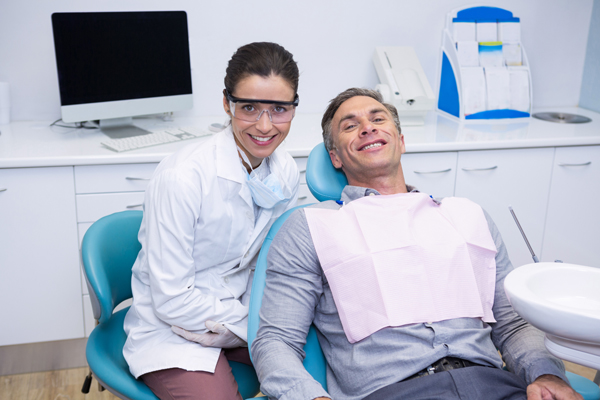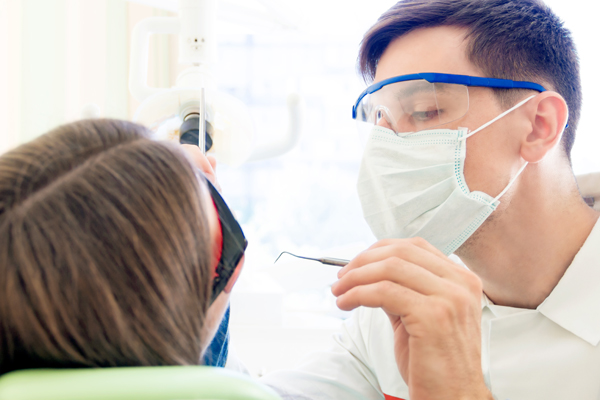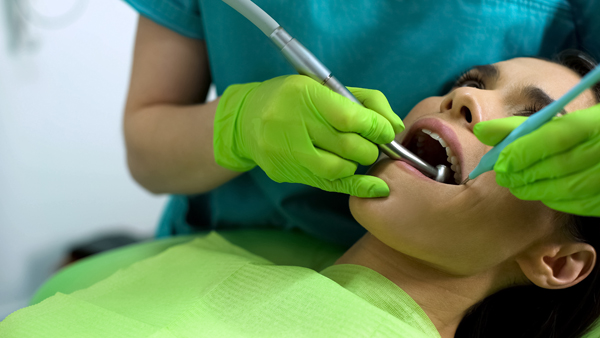Periodontics Livermore, CA
Millions of Americans suffer from periodontal disease. At Vineyard Hills Dental Care, we treat patients throughout the Livermore area that are struggling with this condition and provide a variety of treatment solutions to help combat the symptoms and heal the gums. If you are concerned that your gums are unhealthy, call (925) 233-1143 to schedule an appointment with Timothy Hubbs and receive a dental examination.
What are the signs of gum disease?
You may have gum disease if your gums are red, swollen or bleeding. It is natural for this to happen from time to time after eating something that irritates your gums or brushing too aggressively. However, if this happens on a regular basis then you may have some type of gum disease. Another symptom is bad breath, loose teeth, pain while chewing, sensitive teeth or teeth that appear longer. If you live in the Livermore area, we can examine your gums and let you know what the source of your problem is.
The consequences of periodontal disease
In its early stages, gum disease can cause some irritation and bleeding. There may be some discomfort, but it will be minimal. This stage is called gingivitis. If, however, it is left untreated the disease will spread, and the gums will start to recede by pulling away from the tooth. This creates pockets in the gum tissue that can expose more of the tooth structure and the root system. Once exposed, the tooth and roots are more susceptible to becoming infected as bacteria can gather and start to irritate the area. This can lead to cavities and infections along with bone loss. In severe cases, the bone loss in combination with receding gums can lead to tooth loss. In many cases, adult teeth that fall out due so because of gum disease.
What causes gum disease?
In short – bacteria. When bacteria remain on the teeth, it can form plaque and tartar. When this substance becomes stuck in between the teeth and gums, it can lead to gum complication. The best way to prevent this is to brush and floss several times throughout the day along with visiting the dentist for regular teeth cleanings.
Are certain people at risk for the condition?
There are things you can do to increase your risk for getting gum disease. This includes smoking, hormonal changes, pregnancy, diabetes, certain medications, and genetics. Any time that the blood flow is constricted or reduced, your risk for the disease increases. This is why diabetics and pregnant women are more susceptible to the condition. At Vineyard Hills Dental Care, we recommend that our pregnant patients visit our office at least twice during pregnancy in order to decrease their risk and the pregnancy complications that come with it.
How is it treated?
At Vineyard Hills Dental Care, there are several ways that we treat gum disease. We will make a recommendation after examining your teeth and gums to determine what the source of the problem is and what should be done to address it. The treatment plan is often dictated by the severity of the periodontitis. We recommend that patients look for the signs of gum disease and schedule an appointment immediately so that the least invasive procedure can be used to correct the problem. Once the disease has progressed too far, more significant procedures may be necessary to heal the gums. At times, this can involve surgery.
The first step in addressing gum disease is to complete a deep cleaning. By removing plaque and tartar from the teeth and gums, we can help patients throughout the Livermore area start the healing process. Once the bacteria and plaque have been removed, the gums will start to heal naturally. If the plaque is only around the edge of the gum line, a standard teeth cleaning will work. If it has become trapped between the gums and teeth, a scaling and root planing procedure will be required. In this case, we will need to scrape the plaque off from the teeth underneath the gums. Some dentists use a laser to do so in order to complete the procedure faster.
When surgery is required, it is typically because the gums have receded so significantly. When pockets form in the gum tissue, they need to be restored in order to protect the tooth again. In this case, a gum graft can be helpful. This works by taking tissue from the roof of the mouth or another area and grafting it to the gums so that the gum tissue can start to regenerate. The gums then need to be secured back around the tooth in order to protect it and the roots. If bone loss has occurred as a result of gum disease, a bone graft may be necessary in order to restore and strengthen the tooth. In this procedure natural or synthetic bone is compacted into the area and sealed so that the bone can start to regenerate.
These procedures combined can help to both heal and restore your gums. In order to tell which procedures are necessary for you, call 925-233-1143 and schedule a consultation with Timothy Hubbs. At Vineyard Hills Dental Care, we may start with a deep cleaning to see how well your gums react and start to heal. If they do not recover in short order, we may move to surgical procedures as necessary.
Check out what others are saying about our dental services on Yelp: Periodontics Livermore
How to Keep Your Gums Healthy
You can prevent periodontitis by taking simple steps that include brushing your teeth after meals, flossing on a daily basis and rinsing your mouth with an antiseptic mouthwash once a day. This will help to remove bacteria and sugar from your teeth and gums before they can turn into plaque. Eating a healthy diet that is low in sugar can also help to keep your gums healthy. At Vineyard Hills Dental Care, we also recommend having your teeth cleaned professionally at least twice a year so that we can remove plaque and tartar from hard to reach places. This will ensure that your gums remain healthy.
If you live in the Livermore area, call (925) 233-1143 to schedule your dental exam so that you can remain in good health or receive treatment for a current condition.
Questions Answered on This Page
Q. What are the signs of gum disease?
Q. What are the treatment options for gum disease?
Q. How can I keep my gums healthy?
People Also Ask
Q. Why are my gums receding from my teeth?
Definition of Periodontic Terminology
- Bacterial Plaque
- Bacterial plaque is a sticky film consisting of bacteria that coats teeth and can lead to tooth decay without proper oral hygiene.
- Alveolar Bone Loss
- Alveolar bone loss occurs when the bone containing the tooth sockets in the mouth decreases due to infection or resorption.
- Calculus
- Calculus, also known as tartar, refers to the hardened dental plaque that forms on teeth due to a lack of proper oral hygiene.
- Comprehensive Periodontal Evaluation
- A comprehensive periodontal evaluation is an effective and professional method for examining a patient’s teeth, plaque, gums, bite, bone structure and any potential risk factors to one’s oral health.
- Dental Prophylaxis
- A dental prophylaxis is a thorough cleaning procedure that helps to prevent periodontal disease, gingivitis and the spread of plaque on the teeth.
- Gingival Flap Surgery
- Gingival flap surgery is a procedure in which the periodontist separates the gums from the teeth temporarily to reach the root of the tooth and nearby bone.
- Inflammatory Disease
- An inflammatory disease can result from oral inflammation and can lead to other disorders such as a heart attack, stroke, diabetes, kidney disease, sleep apnea and more.
- Necrotizing Periodontal Diseases
- A necrotizing periodontal disease is a disease that involves the necrosis of gingival tissues and lesions forming in the mouth.
- Peri-Implantitis
- Peri-Implantitis refers to the inflammation of the soft and hard gum tissue that surrounds a dental implant and can be a result of losing supporting bone.
- Periapical Abscess
- A periapical abscess is an abscess that forms from inflammation containing pus in the tissue surrounding the tooth.
- Periodontal Ligament
- A periodontal ligament is a tissue that connects the tooth to the bone and is destroyed by advanced periodontal disease.
- Periodontal Pockets
- Periodontal pockets form when disease destroys surrounding bone and tissue, resulting in pockets that can create space for bacteria to live in.
- Periodontitis
- Periodontitis is a lethal gum infection that results from poor oral hygiene, damaging soft tissue and destroying the bones that support the teeth.
- Periodontium
- The periodontium is the tissue that surrounds and supports the teeth, gums, periodontal ligament and bone.
- Regenerative Procedures
- Regenerative procedures can include services such as bone grafting that replaces missing bone in the jaw with bone from the patient, a donor or a substitute material.
- Root Scaling and Planing
- Root scaling and planing is a non-surgical procedure that involves removing plaque and calculus from the pockets around the root before smoothing the surfaces of the root to help everything heal.
- Root Surface Debridement
- During a root scaling procedure to remove tartar from the surface of the teeth, a professional will also use root surface debridement to ensure the teeth are clean.
Back to top of Periodontics




